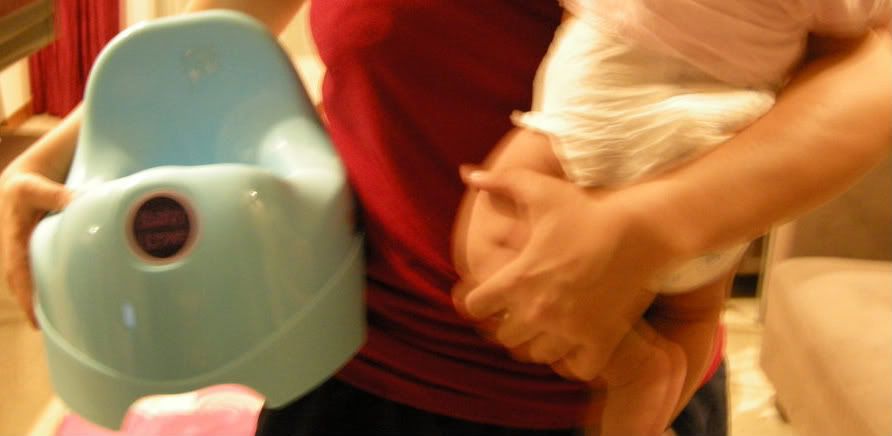
Yesterday, in 'Mum goes potty (I)', Mum gave her comments on the first of three books she devoured as part of her campaign to free Sonny of his diapers. Here are her reviews of the other two:
2) The most scholarly read
Diaper-Free Before 3 (by Dr Jill Lekovic)
If you prefer an academic read on the subject, you’ll enjoy Dr Lekovic's book. As the specialist paeditrician she is, she runs through the development of the medical debate on potty training, citing journals and paediatric association guidelines, to explain why experts nowadays discourage an early start.
Dr Lekovic recommends that parents start training their babies on the potty no later than at three years of age. But she builds a case for why starting earlier is better. She acknowledges, with an eye on the grand sweep of potty history, that mothers used to have no choice but to toilet-train their babies from birth, before the invention of disposable diapers. So why should we forgo the convenience of that modern invention? Her reasons, in a nutshell: To help develop your child’s independence; so they can socialise without shame at play school or child care; to cut risks of infectious diarrhea and Hepatitis A; to promote urinary tract development; and just for lifelong healthy bowel habits.If it’s how-to information you’re looking for, however, be warned that that takes up only about 40 pages of this 200-odd-page book. There are also separate sections on common problems encountered while potty-training and a Q&A for the common queries Dr Lekovic has had to field, which are quite helpful.
3) The most useful readThe Diaper-Free Baby (by Christine Gross-Loh)
Dr Gross-Loh (not a medical doctor; she has a PhD from Harvard) assumes you’ve already decided to potty-train your baby, so she dives straight into what you have to do. It’s a very nifty, user-friendly book. As she spells out in the first chapter, her tome is designed along three tracks: For parents starting Elimination Communication (EC) with newborns, for those with toddlers three to eight months old and finally those with children older than eight months. Just start reading where appropriate, keeping in mind there will be some repetition for those working through the book from the beginning.
Dr Gross-Loh points out some signs to look out for that indicate your child may be ready to eliminate, no matter when you decide to start: When he arches his back, wiggles, has a blank expression or frown on his face, or - in her case - makes the sign for 'potty' using American Sign Language (she taught her children to sign the word before they could speak. Talk about communication!).This book also tries to address parents whether they are trying to practice EC full-time, part-time or even just occasionally: Dr Gross-Loh discusses tips in general, and has short asides on how to cope for the non-full-time practitioner. She also goes through the equipment you’ll need for training your baby, including the array of potties available as well as gear for mother (slings and carriers) and for baby (diapers and specialised EC clothing). An important feature is the quotes and feedback from other parents that she peppers throughout the book, which are often insightful and inspirational.
Mum was very motivated to give EC a try after going through the books. It certainly seemed doable. But with baby full-time at infant care, she can only afford to try it part-time (and this, after centre staff warned that success may lead to constipation if Sonny masters sphincter control. Does this mean it might be pleasurable for him to hold his stool in?)
Alone in her quest - Pa's just observing with amusement from the sidelines - Mum goes through two or three cloth diapers a day after she returns from work, and offers the potty during diaper changes and upon waking in the morning. Mum’s relaxed about the project, so some days she just skips any attempt altogether. Still, she thinks it’s progressing promisingly so far – if you consider 'catching' one or two pees and poops every few days to be progress.
The morning potty trips are the most successful. Otherwise, spotting Sonny when he's about to pass motion is easy as he will squirm and grunt. However, catching it is more difficult as this usually occurs during feeding and so would require positioning a bowl under the little one while he drinks. As for pees, Mum's relentless whistling and shh-shhing has not worked as well for opening the floodgates as just turning on the tap. Seeing the running water inspires him! All in all, it’s a wee bit more laundry and mopping up to take on, a lot of trial and error, plus a huge dollop of patience.
Pa’s just impressed Mum hasn’t given up yet!
(*The books discussed are featured in the sidebar on the right, entitled 'Books Mum Reviewed')





0 Comments:
Post a Comment